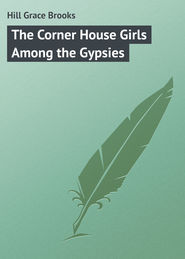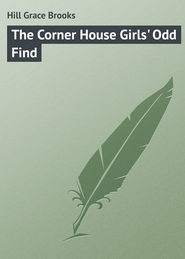По всем вопросам обращайтесь на: info@litportal.ru
(©) 2003-2024.
✖
The Corner House Girls Growing Up
Автор
Год написания книги
2017
Настройки чтения
Размер шрифта
Высота строк
Поля
"What under the sun's the matter with that little pony?" demanded the veteran officer, putting on his eyeglasses the better to see Scalawag and the whole outfit.
"If you pl-please, sir," stammered Sammy, "he belongs to a circus and – and he just can't make his feet behave when he hears a band."
"And do you children belong to a circus, too?" asked the old gentleman in vast surprise.
"Oh, no, sir," Tess put in. "And Scalawag doesn't belong to one now. But he can't forget. If you'll have your band wait, please, until we can drive up this other street, Scalawag will forget all about it."
"Please do, sir," begged Dot. "For we don't really want to go to the seminary; we go to school here in Milton," which peculiar association of ideas rather stagged General MacKenzie.
However, amid the subdued hilarity of the people on the sidewalks, Sammy managed at last to turn Scalawag's head and drive him up Buchan Terrace, and out of hearing of the droning of the band when the funeral procession started again. But it certainly was a memorable occasion for the little mistresses of Scalawag and for Sammy.
Thereafter, when they were driving out, they were continually on the watch for a band, or any other music; and Dot even feared that the old man on the corner who attracted attention to his infirmities, as well as to the pencils he sold, with a small organette, would play some tune that would remind Scalawag of his circus days.
Neale O'Neil would sometimes bring the pony around to the front of the house and have Agnes start a band record on the music machine in the parlor. Immediately Scalawag would try to go through his old tricks to the delight of the neighborhood children.
"Well! it doesn't much matter, I suppose," Ruth sighed. "Every day is circus day at the old Corner House. We have gained a reputation for doing queer things, and living not at all like other folks. I wonder that nice people here in Milton allow their children to play with our little girls."
"Hech!" exclaimed Mrs. MacCall. "I should like to know why not? They're the best behaved bairns anywhere, if their heids are fu' o' maggots," using the word, however, in the meaning of "crotchets" or "queer ideas."
Ruth was no "nagger." She was strict about some things with the smaller ones; but she never interfered with their plays or amusements as long as they were safe and did not annoy anybody. And with their multitude of pets and toys, to say nothing of dolls galore, Tess and Dot Kenway were as happy little girls as could be found in a day's march.
Besides, there was always Sammy Pinkney to give them a jolt of surprise; although Sammy's mother said he was behaving this term almost like an angel and she feared a relapse of the fever he had suffered the spring before.
Neale O'Neil felt of the boy's shoulder blades solemnly and pronounced no sign yet of sprouting wings.
"You are in no danger of dying young because of your goodness striking in, Sammy," he said. "Don't lose heart."
"Aw —you!" grunted Sammy.
Ruth, seeing the practicability of it, was taking lessons in driving the automobile and was to get a license shortly. Agnes felt quite put out that she was not allowed to do likewise; but to tell the truth the older folk feared to let the fly-away sister handle the car without Neale, or somebody more experienced, in the seat with her.
"I don't care, Neale has killed a hen, scared innumerable dogs sleeping in the road-dust, and come near running down Mrs. Privett. You know he has! I believe I wouldn't do much worse."
Ruth pointed out that she need not do much worse in Mrs. Privett's case to have a very bad accident indeed.
"The difference between almost running a person down, and actually hitting him, can be measured only before a magistrate," the older sister said.
Ruth took her lessons from the man at the garage after luncheon, for she did not attend school in the afternoon this term, taking the few studies she desired in the morning.
One afternoon she drove over to Mr. Howbridge's house for tea, and as the car jounced over the railroad crossing at Pleasant Street she suddenly spied a familiar looking object bobbing along the sidewalk. It was a huge green umbrella, and beneath it was the rather shambling figure of the old gentleman whom she had saved from possible accident at this very crossing some weeks before.
He was dressed quite as he had been when Ruth first saw him. If he saw her, the car passed so rapidly that she did not see him bow. At Mr. Howbridge's house she lingered for some time, for the lawyer always enjoyed these little visits of his oldest ward.
Ruth did not return to the old Corner House until almost time for the children to come home from school. Mrs. MacCall was in an excited state when the oldest Corner House girl appeared.
"Hech, ma lassie!" cried the housekeeper. "Ye hae fair missed the crankiest old body I've set my eyes on in mony a day!"
"Whom do you mean, Mrs. Mac?" asked Ruth, in surprise.
"Let me tell 't ye! I should be fu' used to quare bodies coomin' here, for 'tis you bairns bring 'em. But this time 'twas ane o' your friends, Ruthie – "
"But who was he?"
"Fegs! He'd never tell 't me," Mrs. MacCall declared, shaking her head. "He juist kep' sayin' he had a reason for wishin' tae see ye. Ye could nae tell from lookin' into his winter-apple face, whether 'twas guid news or bad he brought."
"Oh, Mrs. Mac!" cried Ruth suddenly, "did he carry a green umbrella!"
"He did juist that," declared the woman, vigorously nodding. "And a most disreputable umbrella it looked tae be. 'Gin ye judged the mon by his umbrella, ye'd think he was come tae buy rags."
"Isn't he a character?" laughed Ruth.
"He's as inquisitive as a chippin'-sparrow," said the housekeeper, with some disgust. "He wanted tae know ev'rything that had happened tae ye since ye was weaned."
"Oh, dear! I'm rather glad I wasn't here then."
"Aw, but fash not yerself he'll nae be back. For he wull."
"No!"
"Yes, I tell 't ye. I seen it in the gleam of his hard eye when he went. I gave him nae satisfaction as tae when ye might be home, not knowin' who he was nor what he wanted o' ye."
"Oh, Mrs. MacCall, don't you remember?" and Ruth recounted the incident at the railroad crossing nearly a month before.
"Huh, that's why he was so cur'ous, then. You saved his life," went on the housekeeper dropping the broad Scotch burr, now that her excitement was cooling.
"I don't know that I did. But perhaps he came to thank me for what I tried to do."
"It seems as though he must want to know every little thing about you," the housekeeper declared. "And how he could corner you with his questions! He should ha' made a lawyer-body. He made me tell him more than I should about the family's private affairs, I have no doot."
"Oh, Mrs Mac! what do you suppose he wants!"
"To see you, belike. And he'll be back again."
"Goodness! I'm not sure I want to talk with him. He looked very odd to me that day I met him. And so cross!"
"No doot of it. He's an ugly looking man. And from his speech it's easy to see he's no friend of womenkind."
"He must be like that Neighbor Cecile was telling us about," sighed Ruth and with that dropped the subject of the strange old man with the green umbrella.
Ruth had heard from Cecile Shepard since she had gone back to the preparatory school – in fact, had received two letters. They were not such bright epistles as Cecile usually wrote; but they were full of her brother. Not that Cecile mentioned Luke's differences with Neighbor, or the reason thereof; but she seemed unable to keep from writing about Luke.
Ruth was secretly as anxious to hear about the young man as his sister was to write about him.
Ruth was heart-hungry. She felt that Luke might have taken her into his confidence to a greater degree; and yet she suspected why he had not done so.
Mr. Howbridge's talk of dowries for the sisters was always in Ruth's mind. Of course, she knew that the Stower estate was rapidly increasing in value. In a few years property that Peter Stower had purchased for a song would be worth a fortune. The Kenways were likely to be very rich.
What if Luke Shepard had no money when he graduated from college? That seemed a very small thing to Ruth. She would have plenty when she came of age, and why could not her money set Luke up in some line of business that he was fitted for?










